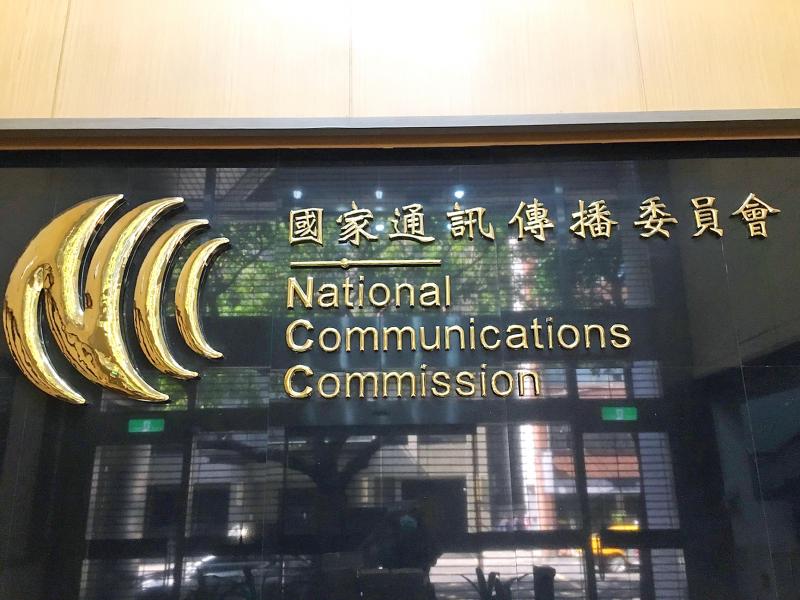Three major telecoms in Taiwan have adopted Voice over Long-Term Evolution (VoLTE) technology, a high-speed wireless communication standard that enhances voice reception, the National Communications Commission said Thursday.
“We are happy that the telecoms are offering the VoLTE system for their subscribers free of charge, and they are encouraged to speed up the provision of such service,” commission Vice Chairman Wong Po-tsung (翁柏宗) said.
Prior to the switch, telecoms were using voice services on 3G systems, even after migrating to 4G or 5G systems, Wong said.

Photo: Yang Mien-chieh, Taipei Times
“3G voice networks are being discontinued internationally, and voice communication quality is greatly enhanced by the VoLTE system. It elevates the efficiency of spectrum usage, conserves energy and reduces carbon emmissions,” Wong said.
Far EasTone Telecommunications last month was the first to stop charging subscribers NT$30 per month for its VoLTE service.
Chunghwa Telecom and Taiwan Mobile said that they would waive the fee for its 4G and 5G service subscribers starting on Monday next week.
VoLTE service is built using 4G technology, and offers three times the voice and data capacity of 3G technology, industry experts said, adding that it shortens the time required to connect calls while enhancing the quality of voice communications.
The VoLTE system allows for better high-speed connections while talking on the phone, as it uses a “VoWiFi” service that continues quality service when 4G reception is poor, they said.
People interested in using the VoLTE service must have the system activated by their telecom carriers and change their mobile phone settings.

POSITIVE DEVELOPMENT: Japan and the US are expected to hold in-depth discussions on Taiwan-related issues during the meeting next month, Japanese sources said The holding of a Japan-US leaders’ meeting ahead of US President Donald Trump’s visit to China is positive news for Taiwan, former Japan-Taiwan Exchange Association representative Hiroyasu Izumi said yesterday. After the Liberal Democratic Party’s landslide victory in Japan’s House of Representatives election, Japanese Prime Minister Sanae Takaichi is scheduled to visit the US next month, where she is to meet with Trump ahead of the US president’s planned visit to China from March 31 to April 2 for a meeting with Chinese President Xi Jinping (習近平). Japan and the US are expected to hold in-depth discussions on Taiwan-related issues during the

‘LIKE-MINDED PARTNER’: Tako van Popta said it would be inappropriate to delay signing the deal with Taiwan because of China, adding he would promote the issue Canadian senators have stressed Taiwan’s importance for international trade and expressed enthusiasm for ensuring the Taiwan-Canada trade cooperation framework agreement is implemented this year. Representative to Canada Harry Tseng (曾厚仁) in an interview with the Central News Agency (CNA) said he was increasingly uneasy about Ottawa’s delays in signing the agreement, especially as Ottawa has warmed toward Beijing. There are “no negotiations left. Not only [is it] initialed, we have three versions of the text ready: English, French and Mandarin,” Tseng said. “That tells you how close we are to the final signature.” Tseng said that he hoped Canadian Prime Minister Mark Carney

President William Lai (賴清德) yesterday bestowed one of Taiwan’s highest honors on Saint Vincent and the Grenadines (SVG) Ambassador Andrea Clare Bowman in recognition of her contributions to bilateral ties. “By conferring the Order of Brilliant Star with Grand Cordon on Ambassador Bowman today, I want to sincerely thank her, on behalf of the Taiwanese people, for her outstanding contribution to deepening diplomatic ties between Taiwan and SVG,” Lai said at a ceremony held at the Presidential Office in Taipei. He noted that Bowman became SVG’s first ambassador to Taiwan in 2019 and

A man walks past elementary school artworks at the Taipei Lantern Festival in Ximen District yesterday, the first day of the event. The festival is to run from 5pm to 10pm through March 15.